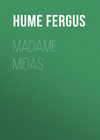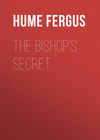Czytaj książkę: «The Mandarin's Fan», strona 14
"And a nice way he repaid his obligations," said Olivia, sharply.
"He's frank enough about his baseness at all events," said Rupert, and then continued the letter. "Markham wanted money, and as the doctor of a liner to Hong-Kong, I had heard of a little-worked gold mine on the Hwei River. I told Markham about it, and proposed that he should go to China to work the mine. He agreed, and took me with him, as he thought that my medical knowledge would benefit him."
"Does Forge say he owned part of the mine?" asked Lo-Keong.
"No. Listen," said Rupert, reading slowly. "I was merely the doctor, as Markham bought the rights to work the mine with his own money. But he promised me a share, and my share now amounts to ten thousand pounds."
"That is true in a way," said Lo-Keong, "out of the money I pay you, Mr. Ainsleigh, this man can certainly claim that amount."
"Then what I receive must be a large sum," said Rupert.
The Chinaman smiled faintly. "Much larger than you think," said Lo-Keong, "pardon my interruption and proceed."
Rupert continued. "But I was not satisfied with my share, and wanted all the money. Lo-Keong had an enemy called Hop Sing, and he promised if I could ruin Lo-Keong that he would put Markham out of the way, and give me the money which had been obtained by working the mine. I knew that Markham had never sent any money home, as he wanted to wait until he could become a millionaire, and then return to astonish his wife, and restore the splendours of Royabay. I therefore saw Hop Sing – "
"I think you can leave all that out, Mr. Ainsleigh," said Lo-Keong, "it is the story I told you."
"So it is," said Rupert, running his eyes down the closely written page. "Well – hum – hum," he picked up the thread of the tale lower down. "It seems," he said, speaking for himself, "that Hop Sing fell into disgrace, and Forge could not get the money. He went to China several times, as Hop Sing recovered his position – "
"And I fell into disgrace," said the Marquis, "the Empress is a woman you know – pardon me, Mrs. Ainsleigh – and whimsical."
"Well," said Rupert, smiling, "you seem to have been up and down several times. When Hop Sing was in favour, Forge went to China, but the Mandarin refused to help him to get the money which was under the control of Lo-Keong, unless the fan was obtained. Forge learned the conditions of the fan, and finally got it from the Major. He took it to England and locked it up in a cabinet. But he was afraid to take it to China or use it in case Hwei should kill him."
"And Hwei would have killed him," said the Marquis, "it was as well that Forge was so careful. But how did he lose the fan?"
"Miss Pewsey took it," said Rupert glancing at the letter.
"A woman," the Marquis took the note from the table, and passed it to Mrs. Ainsleigh. "Tell me, madam, is that a woman's handwriting."
Olivia looked surprised. "It is Miss Pewsey's handwriting."
"Ah," said Rupert, "so she wrote to Lo-Keong telling him the fan was in England. Listen to what the doctor says," and he began to read again. "Miss Pewsey came to my house and was very friendly. She wanted me to marry her, saying she was trying to get Miss Wharf to leave her the money, that should have been left to you Mrs. Ainsleigh."
"Ah," said Olivia significantly, "so she did work for that. Go on."
The letter went on as follows: – "I didn't like Miss Pewsey who was old and ugly and evil – much worse than I ever was, in my worst days. But she haunted my house and I got used to her. I used to smoke opium, and grew very ill. In fact on more than one occasion I became delirious. Miss Pewsey came and nursed me. She took advantage of my delirium to learn the whole story of the fan, and learned also – don't be startled at this Mrs. Ainsleigh – that through me Markham had lost his life."
"We know that from the Marquis," said Rodgers, "but I suspect Mr. Forge wouldn't have spoken out had he not guessed the Marquis would tell the whole yarn. Go on Mr. Ainsleigh."
"Miss Pewsey," went on the letter, "insisted that I should marry her, or else she threatened to reveal the story to Rupert. I was unwilling that this should be, as I thought – and very rightly – that I should get into trouble."
"And he would have," Rupert, broke off grimly to explain, "I should have shaken the life out of him. However, to continue," and he again began to read this highly interesting letter. "I therefore agreed to marry her, but always sought an opportunity of escape. During one of my insensible fits after a bout of opium smoking, Miss Pewsey took the key from my watch chain and opening the cabinet gained possession of the fan. I denied this to Major Tidman at Miss Pewsey's behest, or else Miss Pewsey would have denounced me."
"Not she," said Rodgers, chuckling, "she would have lost her husband had she done so."
"She has lost him in any case," said Olivia, "but I can tell you what is in the rest of the letter, as I see Rupert is tired of reading. Miss Pewsey gave the fan to Clarence to give to me – "
"To win your favour," said Rupert.
"No. To bring about my death. Miss Pewsey thought if I was out of the way, she would get Aunt Sophia to leave her the money."
"What a wicked woman," said Lo-Keong, "we have none such in China."
"Well," went on Olivia rapidly, "Miss Pewsey wrote to the Marquis saying the fan was in England – "
"Here is the letter," said Rodgers nodding towards the epistle.
"Yes. How strange I should see it almost immediately after Dr. Forge wrote," said Mrs. Ainsleigh innocently.
"Miss Pewsey laid her plans well," said Rupert, looking again at the letter, "she intended to tell Hwei that Olivia had the fan so that she should be killed. But Olivia refused the fan, and Miss Pewsey made Clarence give it to Miss Wharf, so that the poor lady might be killed. But Miss Pewsey delayed the death at the hands of Hwei by holding her tongue, till a will was made in her favour. Chance favoured her, for she got the will altered."
"By learning of our marriage when she played the spy," said Olivia.
"Quite so," said Ainsleigh, "she then read the advertisement and knew that the two men, Hwei and Tung-yu, were in England. She wrote and told them that Miss Wharf had the fan. The letter was sent shortly before the ball, and after the new will was made. Tung-yu, therefore, came down to the ball to get the fan. This was not what Miss Pewsey wanted, as she desired Hwei to kill the woman."
"She knew about the god Kwang-ho, then?" asked Lo-Keong.
"I think so, but Forge isn't clear on that point. However, he declared that he does not know who killed Miss Wharf, nor who has the fan. He was told by Clarence, how he, – Burgh, had accused him to the Chinamen, and then grew fearful. Also, he heard that the Marquis was in England, and so he knew the whole story would come out. As he dreaded arrest, he fled."
"But he could have prevented Burgh from speaking," said Olivia, "you know, Rupert, how Mr. Burgh told you that Forge knew things about him."
"I daresay if the Marquis had not come to England, Forge would have silenced Clarence and fought the matter out. But he knew that the truth about my father's death would be told by the Marquis, and also dreaded, lest he should be accused of Miss Wharf's murder. He says that Clarence never gave him the tie as he says he did, and declares that he was in the card-room all the evening."
"How does he end the letter?" asked Rodgers.
Rupert read the last words. "So I write you this, Mrs. Ainsleigh, to show you that I am innocent of the death of your aunt. I see that the game is up and that I'll never get the ten thousand from Lo-Keong. Also, if I remain, I shall have to marry Miss Pewsey and cannot bear the idea. When you get this I'll be far away on the sea on a voyage to a land I need not particularise."
"Not China, I hope," said the Marquis, "if he comes there again, I shall have to kill him. He deserves to be punished for having brought about the death of my friend Markham Ainsleigh. What is to be done now, gentlemen? We are no further on than before."
"We certainly don't know who had the fan," said Rodgers.
"Or who has the packet," put in Olivia.
"Tung-yu has it I am sure," said Lo-Keong.
"I don't agree with you, Marquis," said the detective. "Tung-yu and Hwei certainly cleared back to Rotherhithe by that yacht, but if the fan had been on board Hwei would have spotted it."
"Tung-yu is very cunning," said the Marquis doubtfully.
"Well," said Rupert, folding Forge's letter up, "I suggest that the Marquis should offer a large reward for the fan with his own name appended. Then whosoever has the packet will bring it. For of course," added Rupert shrewdly, "those who had the fan – if more than one – will have the packet."
"Tung-yu – Tung-yu," said the Marquis shaking his head, "however, I will try the advertisement, and appoint a place. I am willing to give a large sum for the packet."
"And I am prepared to arrest the person who brings the packet as the murderer of Miss Wharf," said Rodgers, "you leave the thing to me Marquis."
"Come with me to London my friend," said Lo-Keong, "and we will write the advertisement. I shall reward you largely, if you get this packet back again."
"And what will you do, Rupert?" asked Olivia eagerly.
Her husband looked up. "I shall hunt for the packet on my own account."
"Good," said Lo-Keong in his stately manner, "we will see who is fortunate enough to bring me the packet and earn," he looked at Rupert impressively, "one hundred thousand pounds."
CHAPTER XXII
After-Events
Rodgers went to London with the Marquis Lo-Keong that very day, and Rupert wanted to go also. But Olivia objected to this, she feared lest her husband should be wounded again. "I don't wish to lose you darling," said Mrs. Ainsleigh coaxingly.
"But the money," said Rupert dubiously.
"You mean the hundred thousand pounds," said Olivia. "That will be paid to you by the Marquis. It is rightfully your own."
"Humph! It seemed to me that Lo-Keong hinted he would pay the money to whomsoever brought him the packet. In that case Rodgers – "
"Nonsense," said Olivia quickly, "I am quite sure that the Marquis means well to both of us. No doubt he will reward Rodgers largely, should he get the packet: but he will give you your father's money."
"All the same I should like to hunt for the packet on my own account, Olivia," said Rupert obstinately.
"Let those hunt, to whom the packet is of value."
"But I don't believe that this advertisement will bring forth anything," argued Ainsleigh frowning "if Tung-yu has the packet, he certainly won't pass it along to Lo-Keong. If Burgh stole it, he will be afraid lest Hwei, who is in Lo-Keong's pay, should kill him. As to Tidman – "
"You thought he was guilty," said Olivia smiling.
"And I still have my doubts," rejoined her husband, "so I'll call at the Bristol and have a talk."
This conversation took place the day after the Mandarin had departed and Rupert was worrying about the exciting chase for the packet, which he foresaw would take place. However, as Olivia insisted, he should not risk his life again with Asiatics, he interested himself still in the case by talking it over with Major Tidman. On arriving at the Bristol, he was shown up at once to Tidman's room, and found the Major spick and span as usual, but greatly excited.
"I was just coming up to see you," said the Major, "look here?" and he handed Rupert the morning's copy of the Daily Telegraph.
Ainsleigh looked at the place indicated by the Major, and saw the advertisement asking for the return of the fan, on delivery of which the sum of five thousand would be paid. "I see that the Marquis has lost no time," said Rupert throwing down the paper, "he and Rodgers must have inserted the advertisement at once."
"Oh," said the Major staring, "so you know."
"Yes. Lo-Keong and Rogers were with me yesterday."
"Lo-Keong. Why that is the man who owns the fan?"
"Exactly. He is a Marquis, and high in the service of the Empress Dowager of China. As to the fan – " Rupert rapidly detailed how it had been found in the cloisters and related also the subsequent discovery, that the box attached to the chain in the tree trunk, was empty. "And the man who took the fan from Miss Wharf's dead body stole the packet," said Rupert, "so it is not likely he will risk arrest by coming forward to give the papers to Lo-Keong."
Tidman sat down astounded at these revelations. "I wish I had been present," said he, "I was always curious about the fan's secret. A very ingenious device, Ainsleigh."
"Very," assented Rupert dryly: then he cast a side-long look on the Major, and spoke to the point. "You had nothing to do with the stealing of the fan I hope, Major."
"I," cried Tidman bouncing from his seat like an india rubber ball.
"Well you see," went on Rupert, "we met on the beach after eleven, but it is just possible in spite of Forge's evidence, that Miss Wharf may have been killed before then."
"And you believe that I killed her. Thank you Ainsleigh."
"My good friend," rejoined the young man calmly, "Lo-Keong believes that Tung-yu broke his oath before the god, and strangled Miss Wharf. But I disagree with him, as Tung-yu could have procured the fan by milder means, the next day. Hwei could not have strangled the woman, as he was haunting the Abbey grounds to see if the packet was still safe. Forge, in a letter to my wife, insists that he never got the tie, and certainly did not kill Miss Wharf, so – "
"So you have narrowed it down to me," cried Tidman in a burst of indignation, "it's too bad of you, Ainsleigh. I am not a thin skinned man by any means: but I do feel this very deeply. I swear," the Major flung up his hand dramatically, "I swear that I never possessed the tie, and I never killed Miss Wharf and I never took the fan and – "
"That's all right," interrupted Rupert, "if you did not take the tie, you certainly could not have strangled the woman. After all, perhaps I have been too hard on you, Major."
"Ah," said Tidman angrily, "you are prepared to take my word for it now, unsupported by other evidence. Your accusation can't be made seriously, Ainsleigh."
"Well upon my soul," said Rupert passing his hand through his hair, "I really don't know what to think or say. This case seems to grow more mystical at every step. I admit that, as you deceived me at the time, we discussed the advertisement – "
"You think I deceived you again. Well I did not. That was my one and only deception. I wanted the fan in order to procure money I admit: but the danger of being killed by Hwei instead of being rewarded by Tung-yu was too great. I dropped the matter."
"Then who do you think is guilty?"
"Clarence Burgh. Oh I am sure of it. He admits that Miss Pewsey told him the tie was in the over-coat pocket. No doubt he took it out and used it to incriminate you. Then again, Burgh learned from Tung-yu how the picture could be rendered visible – "
"True enough," mused Rupert, "well, he might be guilty. And he certainly was in the cloisters one day – "
"So as to examine the place," said the Major. "And afterwards, he came at night in the monk's disguise, knowing about the ghost and the legend. He was startled when he secured the packet and left the fan by accident on the black square."
"Or by design" said Ainsleigh, "remembering the prophecy which says that 'gold will come from the holy ashes.' If I get this one hundred thousand pounds the prophecy will certainly be fulfilled, in a sort of way. It was indirectly owing to the fan that Lo-Keong told me of the money my father made in China, and through the fan, when the packet is restored, he intends to give the money to me."
"Oh humbug," said the Major contemptuously "I don't believe in that foolish rhyme a bit. But are you of my opinion that Burgh is guilty?"
"Yes – in the way you put it, it seems probable."
"Well then," said Tidman angrily and striking the table with his fist. "I have had enough of being suspected, so I'll help you to hunt down the assassin. I must know who killed Miss Wharf, or else you will be accusing me again. See here," and he threw a paper on the table.
It was a square of yellow paper, strongly perfumed, which asked the Major to bring the fan to the den in Penter's Alley. "You showed me this before," said Rupert. "I went up on your behalf."
"Look at the date," said Tidman pointing, "it's a new invitation. I think Tung-yu – who writes the letter – believes I killed the woman and have the fan after all. Well, last time, you went on my behalf, this time, danger or no danger I'll go myself. You can come if you like."
"I shall certainly come," said Rupert jumping up, "Olivia does not want me to proceed further in this matter, but, now that you are going, I'll go too. Tung-yu can't know that the fan is in my hands, or that the packet is missing."
"He's not so clever as I thought he was," said Tidman coolly, "or he wouldn't have bungled this affair as he has done. I am not afraid of him, now. But you see that the appointment is for to-morrow night at nine o'clock."
"At Penter's Alley under the lantern. Exactly – the same place. But as Rodgers knows of my adventure, I wonder Tung-yu risks another meeting. Besides, Rodgers told me he had been to the den and found both Chinamen gone."
"Oh, thunderbolts never strike in the same spot twice," said Tidman, "it is the safest place. Rodgers, having gone once, will not go again. Well, will you come?"
"Yes," said Rupert, firmly and went back to the Abbey, to persuade his wife to let him make one more attempt to solve the mystery.
Olivia was obdurate at first, but after a time, she yielded, though she assured Rupert she should be miserable all the time he was away. "And do take care of yourself," she said.
"Of course I'll take every care," replied her husband; and so it was arranged that Rupert should go up to town with Major Tidman by the six o'clock train the next evening, and proceed to Penter's Alley, to see Tung-yu, and learn – if possible, the truth.
Olivia's attention was somewhat taken off the projected expedition to the wilds of Rotherhithe, by a visit from Lady Jabe. That eccentric female, looking more like a judge than ever, and dressed in a most manly fashion appeared, with a shining face, to announce that Chris was engaged to marry Lotty Dean.
"It's most delightful," said Lady Jabe, "her father is merely a retired grocer, but I have consented to over-look that, if he settles some money on the young couple."
"And has he consented?" asked Olivia languidly. She did not take much interest in the affairs of Mr. Walker.
"Yes. Mr. Dean has allowed his daughter a thousand a year, paid quarterly," said Lady Jabe amiably, "and that, with what Chris earns at the office, will keep us nicely."
"Us?" echoed Mrs. Ainsleigh smiling.
"Certainly," was Lady Jabe's calm reply, "I have been a mother to Chris, and I intend to be a mother to Lotty. I shall look after the house, and control the purse, otherwise, the young pair may get into the bankruptcy court."
Olivia privately thought that under Lady Jabe's care the young couple, would have a bad time, even though they might be free from bankruptcy. "What does Mr. Walker say?"
"Oh Chris is delighted. He had better be. I'd like to see him cross me, dear Olivia. I've broken his spirit thoroughly. Lotty certainly is a trifle difficult, but I'll break her also by degrees."
"I think you should leave Mr. and Mrs. Walker to manage their own affairs," said Olivia indignantly.
"Oh dear me no," replied Lady Jabe calmly, "that would never do. A couple of babies, my dear Olivia, who need a firm hand. I'll look after them and receive a small sum for doing so. My late husband did not leave me well off," she went on confidentially, "so it is necessary that I should do the best for myself. But now, that's all settled and I'm glad you are pleased."
"Not with your proposed arrangement, Lady Jabe."
"Oh, yes you are, dear Olivia. Nothing could be better, whatever you may say. And now to talk of other and less pleasing matters. Miss Pewsey who robbed you of your inheritance, is about to leave Marport. Yes – you may look surprised: but she is selling Ivy Lodge and intends to go to America."
"In search of the doctor?" asked Mrs. Ainsleigh doubtfully.
"Quite so, I understand that Dr. Forge has gone there. But just think what a brazen women Miss Pewsey must be, to follow a man who left her – as you might say at the altar. Miss Pewsey is in London now making arrangements to sail for New York – so she told me yesterday. I wish her all joy," added Lady Jabe shaking her head, "but I fear the man will spend her money and leave her."
When Lady Jabe went, Olivia thought over the projected departure of Miss Pewsey on the trail of Dr. Forge. She was glad at heart, that her enemy was leaving Marport, but could not help thinking that the bitter little women was going out of her way to make trouble, for herself. And as Forge was wanted, for participation in Markham Ainsleigh's murder, Olivia though she would inform her husband of his whereabouts, so that he might be brought back if necessary. But Rupert listened thoughtfully, and then replied after consideration.
"I won't move in the matter," he said calmly, "Forge behaved like a scoundrel, but as he has gone, I leave him in God's hands. He will get his deserts yet, Olivia."
"Will you send him the ten thousand pounds, Rupert?"
"No," said the young man decisively. "I shall certainly not do that. Forge deserves some punishment and shall have it, by being deprived of the money he sinned to obtain. He did not kill my poor father, but he certainly brought about his death indirectly. Leave him to God, Olivia. As for ourselves, we will get our own money from Lo-Keong, and restore the Abbey."
"And Miss Pewsey's mortgage?"
"It is due shortly before Christmas, and I shall be able to pay it off before then. Miss Pewsey has done her worst, Olivia. Henceforth she will be harmless."
"And what about her punishment, Rupert?"
"I should think the loss of Forge has punished her. And, if she really intends to follow him, she will be more disappointed. The man will not marry her. No, Olivia, Miss Pewsey also sinned to get money, but she will be punished, you may be certain."
The next evening Rupert again assumed his old suit and heavy cloak and went away. Olivia clung to him as he left the door. "Oh my darling be careful," she said, "if you are killed – "
"I won't be," Rupert assured her. "I have taken the precaution to write telling Rodgers of this meeting. He will bring, by my advice, a couple of plaincloth policemen to Penter's Alley, and if there is trouble, both the Major and I will be able to get away."
Comforted thus, Olivia kissed her husband, and saw him drive down the avenue. Then she returned to her room to count the moments, until he returned. All their troubles had brought Olivia and Rupert closer together, and in their implicit trust in one another, lay the elements of future happiness.
Ainsleigh found the Major also plainly dressed, waiting at the station, and the two were speedily on their way to town. Owing to an accident to the train, they were late in arriving at Liverpool Street station and the Major fumed. "We won't be in time," he said when they went to the underground railway.
"Oh, I think so," said Rupert calmly, "it's just as well, we should not be too early. I want Rodgers and his men to be on the spot."
"But what do you think will come of all this?" asked Tidman, nervously.
"I think we will find the papers."
"But if Tung-yu had them, he would not have written to me."
"He is playing some sort of game. I can't understand, and I have given up theorizing. Let us wait."
The Major grumbled a little, but finally agreed that Ainsleigh was right. They soon arrived at Rotherhithe, and stepped out into the main street. The night was fine, and there was a bright moon. "I like this better than when I was here last," said Rupert, as the two went down to Penter's Alley.
"It's a good thing there's a moon," said the Major casting a glance upward, "if these Chinamen try to bolt, we can chase them."
"Do you expect Hwei to be there also?"
"I can't say," said Tidman, "but if Tung-yu is, I suspect Hwei won't be far off. They work in couples as you know."
"And pull against each other like ill-matched dogs," said Rupert, "a queer compact, this."
"It's silly. I think the Mandarin must be mad with all this rubbish about his gim-crack god Kwang-ho. Here we are – and there's the lantern. What a narrow street."
They stepped down the Alley in the bright moonlight. The lantern flared above the same house as Rupert had entered before, and at the door stood a small figure. It was the Chinese boy dressed in red. "Ah," said Rupert significantly, "Hwei is certainly here, as well as Tung-yu. We'll have trouble."
"If Hwei tries to kill me, I'll shoot," said the Major, and produced a neat revolver. "I've held my life in my hands before now."
Rupert was about to speak to the boy who stood silently before the closed door, when he heard a long agonised scream within the house. The boy smiled in a cruel manner, and Rupert tried to dash past. But the boy prevented him. Tidman, however, was more fortunate and flung himself against the door. Evidently, a tragedy was taking place inside. As the Major ran forward, the door opened suddenly and Burgh dashed out and down the street, towards the river. After him came Tung-yu, his face alive with fury. Tidman gave a shout, and made after the two, but Rupert, wondering who was being killed, sprang down the passage and entered the room, where formerly he had met with the adventure. A tall Chinaman was standing in the middle of the floor wiping a knife on his blouse. He turned, and Rupert beheld Hwei. The Chinaman pointed to the floor with a ghastly smile. "The doom of the god Kwang-ho," said he, and ran out of the house swiftly.
Rupert cast his eyes on a body lying on the floor. It was that of a woman and from her breast a stream of blood was flowing. She was not yet dead, but looked up with a pain-drawn face. Ainsleigh drew back with an exclamation. It was Miss Pewsey.




















